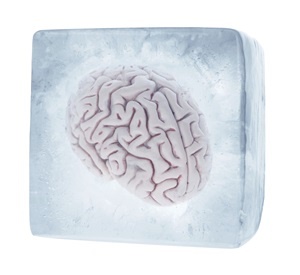
What’s more refreshing on a blistering summer’s day than a delicious scoop of ice cream? Nothing, except when you gulp it too quickly. The instant blinding headache that follows feels as if your brain has dropped below zero.
No wonder you can’t even pronounce sphenopalatine ganglioneuralgia, the medical term for brain freeze or ice cream headache! This common occurrence happens when you eat ice cream or an icy cold drink too quickly.
Brain freeze might feel as if icicles are forming in your brain, but it actually has more to do with changes in blood flow to the brain than your brain itself, comments medical physiologist Dr Derick van Vuuren of Stellenbosch University.
“When something very cold (like slurping ice cream or an ice cold drink) comes into contact with the roof of the mouth and the back of the throat, it changes the temperature in that area.
Read: Is it a migraine?
The surrounding blood vessels that supply blood to the brain react by narrowing and dilating as a mechanism to stabilise the brain’s temperature as much as possible,” he explains.
But why the awful headache that comes out of nowhere? Neuroscientist Dr Dwayne Godwin of Wake Forest Baptist Medical Center says the pain associated with brain freeze is sensed by receptors in the outer covering of the brain called the meninges, where two important arteries meet.
“The internal carotoid artery in the back of the throat feeds blood to the brain, while the anterior cerebral artery is where brain tissue starts. When the cold hits and these arteries dilate and contract, the brain interprets this sensation as pain,” he explains.
Dr van Vuuren says even though the brain has billions of neurons, it can’t actually feel pain, so scientists believe brain freeze involves referred pain. “This means when the brain receives a pain input from one part of the body, but then accidentally associates this pain with the wrong part of the body, resulting in pain felt in a different place in the body than where it originated from.”
Makes sense to the body, but why do you sometimes experience brain freeze pain in your nose or eyes?
Neuroscientist Professor Bill Griesar at Washington State University, Vancouver believes brain freeze may be connected to the trigeminal nerve that stretches across the face and helps the brain and face ‘communicate’ by transmitting information from the face to the central nervous system.
“This important nerve stretches out in three branches that contain clumps of neurons called ganglia.
It appears that narrowing and widening blood vessels put a lot of pressure on the ganglia, resulting in the trigeminal nerve sending a message to the brain that you are in pain.”
Therefore, with a brain freeze-related headache, the pain originates in the roof of your mouth, but because both the nerves in this area and the forehead “feed” into the trigeminal nerve, your body perceives the stimulation of this nerve as the forehead hurting, says Dr van Vuuren.
Read: Ice-cream headaches a clue to migraines
While nerves often communicate pain to alert the body to possible threats, brain freeze ache is unlikely to be harmful. Luckily, ice cream headaches are also very fleeting, since the pain subsides as soon as the cold dissipates and the blood flow normalises, remarks Dr van Vuuren.
He says scientists are still interested in the brain freeze ‘because a lot of research indicates that changes in blood flow to the brain might explain more serious headaches like migraine and cluster headaches.’
Neuroscientist Dr Godwin confirms that by studying brain freeze (which researchers can easily induce without any long-term problems); they can ‘learn more about headache mechanisms and expand their understanding to develop better treatments."
As for preventing brain freeze, Dr Godwin’s advice is a no-brainer – don’t eat ice cream or glug icy drinks! However, if you can’t quit your ice cream fix, normalise the temperature in your mouth by pushing your tongue up to the roof of your mouth or sipping a lukewarm drink.
Relieved that brain freeze is not life threatening and doesn’t require ice-cream abstinence, I’m celebrating with a hearty dollop of my favourite icy treat!
Read More
How does the body respond to touching something hot?
Sources
1. Wake Forest Baptist Medical Center. "Neuroscientists explain how the sensation of brain freeze works." ScienceDaily, 22 May 2013.
2. Dr Derick van Vuuren, medical physiologist, Faculty of Medical and Health Sciences, Stellenbosch University
3. http://www.livescience.com/19834-brain-freeze-blood-flow-migraines.html
4. http://www.medicalnewstoday.com/articles/244458.php
5. https://askdruniverse.wsu.edu/2016/03/21/brain-freezes/




 Publications
Publications
 Partners
Partners










